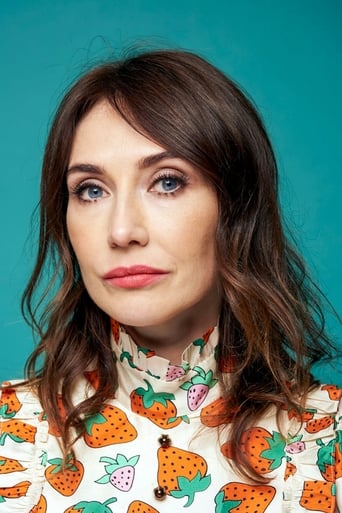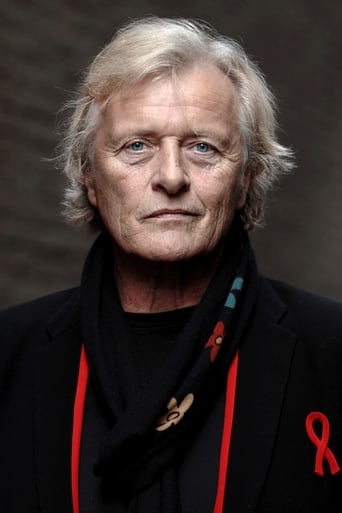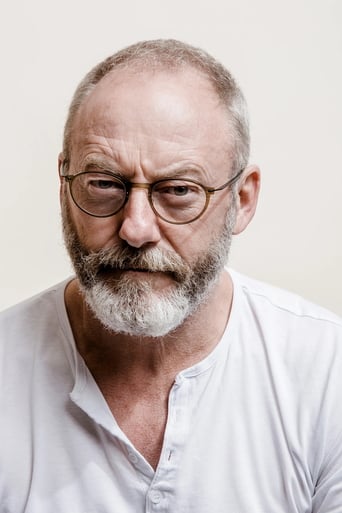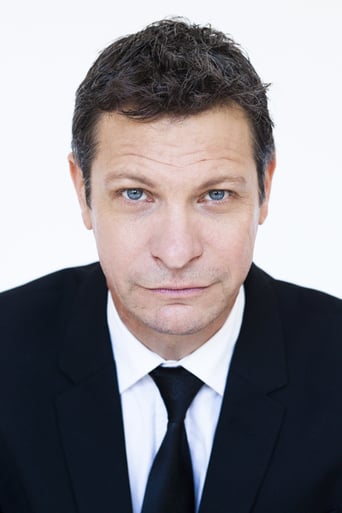Pacionsbo
Absolutely Fantastic
SteinMo
What a freaking movie. So many twists and turns. Absolutely intense from start to finish.
Catangro
After playing with our expectations, this turns out to be a very different sort of film.
Deanna
There are moments in this movie where the great movie it could've been peek out... They're fleeting, here, but they're worth savoring, and they happen often enough to make it worth your while.
stephanlinsenhoff
The undeniable fact: we are born by parents. To be an individual: our responsible is to discard the parental form and replace our own. What we want to be and are. Guided by our very own ideas as model. Few reach this goal. A copy of what should be discarded. Not many manage and resume as copy their life. Among the not many is the life of Karin Jonkers. The fathers denial of his daughter, himself not only a writer but also a politician, made public in his speech his denial. The ultimate proof that both are individuals. Upright.Accepting the consequences. In public for all those cowards who choose the broad side of life. Like this his comment of her suicide has to be not only looked at but seen, reportedly he said: "They can throw her back in the sea for all I care." We have to, must as child of our parents discard the form we received at birth. By birth she was destined upper-class. Many are, growing up, revolutionary, sinking back into the comfortable frame of life. Even she. As it seemed. But consequently her loyalty was her own, focused on the South African questions many looked at, denying to see. Not caring what whoever told her to do: her divorced husband her lovers, her friend Jack Cope, himself a writer who always was there when needed. Nelson Mandela read her poem, "Die kind (wat doodgeskiet is deur soldate by Nyanga)" ("The child (who was shot dead by soldiers at Nyanga)"), in Afrikaans, during his address at the opening of the first democratically elected parliament on 24 May 1994.Ingrid Jonkers was homeless and in need of love. Apartheid, her father responsible for censorship was her enemy. Neither Jack Cope and Andre Brink helped or could help. She had to manage it alone. She was loved and loved but homeless. As it happened with the New Zealands poet and writer Janet Frame, also Ingrid Jonkers was periodical in a mental hospital: sent by her father! ... She and a few others home is the fringe of, what generally is called madness. But here, as society's fools, poetry and real life is the only true possibility. She is sane and insane. Not either-or but proofs that both is possible - as long as everything is given and nothing to loose and be taken.
gradyharp
BLACK BUTTERFLIES is a biographical drama based on the life of Ingrid Jonker. For those who are unfamiliar with this poet the following description my aid in the appreciation of this film: 'Ingrid Jonker (19 September 1933 - 19 July 1965) was a South African poet. Although she wrote in Afrikaans, her poems have been widely translated into other languages. Ingrid Jonker has reached iconic status in South Africa and is often called the South African Sylvia Plath, owing to the intensity of her work and the tragic course of her turbulent life. Her work has also been compared to that of Anne Sexton.' Greg Latter has written the screenplay that attempts to give us all the facets of this enigmatic personality and the film is directed by Paula van der Oest. It is obviously an act of love.We meet Ingrid and her sister Anna as children, poor, without shoes, and taken to the home of their Apartheid father Abraham Jonker (Rutger Hauer) the Minister of Censorship for the parliament of South Africa. As Ingrid (Carice van Houten) matures she becomes a beautiful, but impetuous young poet, feeling abandoned, blaming others, promiscuous, escaping in excessive drinking too much in order to feel safe and able to cope, and becoming overwhelmed by conflicting emotions, which characterize some common personality disorders. At her father's demand she married Pieter, has a daughter by him, and leaves him because she feels trapped. While swimming in the ocean she nearly drowns but is saved by writer Jack Cope (Liam Cunningham) - this act results in a love relationship and despite Jack's decaying marriage they plan to live together. They both support the young South African poet Nkos (Thamsanqua Mbongo) and aid his escape form South Africa to Europe in hopes of finding freedom to write. Ingrid's and Jack's relationship is passionate and stormy: Ingrid has affairs simply because she has the freedom of mind to do so, and the affair with one Eugene Maritz (Nicholas Pauling), a married man, drives Jack away. Ingrid aborts the child she conceived with Jack (Jack does not know this) and eventually does the same with a child conceived with Eugene. All the while Ingrid is suffering form her inner demons but at the same time becoming more aware of the cruelty of Apartheid. Her writings reflect these feelings and are censored by her father. Yet her greatest collection of poems about the Apartheid are published despite her father's wishes and her father disowns her for being a wasted 'slut.' Ingrid's increasingly bizarre behavior results in several psychiatric hospitalizations and suicide attempts and she goes to Paris where she is treated with electroconvulsive therapy. The treatment calms her but robs her of the ability to write poetry and during the night of 19 July 1965, Jonker went to the beach at Three Anchor Bay in Cape Town where she walked into the sea and committed suicide by drowning.Carice van Houten, Liam Cunningham, and Rutger Hauer offer brilliant performances and the support cast is strong - Candice D'Arcy as Ingrid's sister Anna, Grant Swanby as Jan Rabie, and Graham Clarke as Jack's closest mate Uys Krige. During the film's credits we hear Nelson Mandela reading Ingrid's prize winning poem 'The Dead Child of Nyanga', probably the most important poem to influence the end of Apartheid.She searched for a home, she searched for love. Confronted by Apartheid and a father who was Minister of censorship. With men like Jack Cope and Andre Brink she found much love, but no home. In his first speech to the South African Parliament Nelson Mandela read her poem "The Dead Child of Nyanga" and addresses her as one of the finest poets of South Africa. The child is not dead The child lifts his fists against his mother Who shouts Afrika ! shouts the breath Of freedom and the veld In the locations of the cordoned heartThe child lifts his fists against his father in the march of the generations who shouts Afrika ! shout the breath of righteousness and blood i n the streets of his embattled prideThe child is not dead not at Langa nor at Nyanga not at Orlando nor at Sharpeville nor at the police station at Philippi where he lies with a bullet through his brainThe child is the dark shadow of the soldiers on guard with rifles Saracens and batons the child is present at all assemblies and law-givings the child peers through the windows of houses and into the hearts of mothers this child who just wanted to play in the sun at Nyanga is everywhere the child grown to a man treks through all Africathe child grown into a giant journeys through the whole world Without a passThis is a courageous and deeply moving film about a great poet. Grady Harp, April 12
anthonydavis26
This review was made for Cambridge Film Festival (UK) - 15 to 25 September 2011* Contains spoilers *As expected, Liam Cunningham (as Jack Cope) was excellent, but Carice van Houten, playing poet Ingrid Jonker, was a revelation. To those in the know, she perfectly carried out a role that betrayed the traits of impetuosity, feeling abandoned, blaming others, promiscuity, drinking too much in order to feel safe and able to cope, and becoming overwhelmed by conflicting emotions, which characterize some common personality disorders (they would probably have called them neuroses then).Yet, as is by no means inconsistent, her character was delightful, and she filled the screen with feeling, from seducing Jack, and showing the characters' hunger for each other in the very beautiful sex-scenes, to hurling objects at him with extreme force. There are claims that she has had other lovers, but Eugene and Jack, the ones who are definite, both find her draining, as well they would. A force for life is hard to live with, after all.Rutger Hauer as Ingrid's father (eerily resembling my former university tutor facially) has a harsh love (eventually, on account of her alleged sleeping around, he dismisses her as a slut), likely to have been one of the things that contributed to how she reacts to life and, through doing so in later life, the three psychiatric admissions that we see (or hear of), the last of them leading to electroconvulsive therapy (ECT). Although it is not always true that people are never the same after it, she is damaged.She is also damaged by the child whom she wished she had kept, and by the one fathered by Eugene, and which led her to desperate steps in Paris and that last admission. Whereas the film does not pretend to portray Ingrid's life or that of others who were close to her faithfully, hearing Carice (and, against his judgement, her character's father) read her verse will encourage a journey to look out her writing, not least given that is was allowed such a prominent place in the new South Africa.Maybe the real Ingrid wrote on the walls, maybe she didn't, but it set up a world in which desperate words written in the condensation in Paris were hurtingly real, and also tragically echoed her having made love to Jack in her old room at her father's house (the old servants' quarters), their bodies touching and mingling with her script.Not exactly a love-story, through she clearly does love Jack (but cannot be 'faithful'), but one about what it is to feel, love and live, and to write faithfully what one believes in, whatever the cost.
CineCritic2517
Butterflies tries to show us the hardship of the poet Ingrid Jonker in the 50's and 60's in South Africa; her social and mental struggles and the clashes with her family. Striving for equality between the races, she finds herself opposed to her father who heads up a government censorship board. This could have been a good backdrop for some decent drama and the portrayal of a country raped by apartheid. But besides shoving an unlikable protagonist down our throats (Jonker), the film offered very little in the way of plot and dialog. What was presented in stead was a 90 minute volley of uneasy situations with Jonker interacting with characters who turned up whenever the script required it without a plot-inspired narrative flow. The connections to her surrounding characters are never really explored and the development of situations felt awkwardly and needlessly rushed. The interactions between Jonker and her father for example, which should have been key scenes in the film, lacked any additional purpose besides the very obvious. Screenwriter Greg Latter, who did much better when he wrote the screenplay for the 2007 movie Forgiveness, also set in South Africa, really missed the mark here by only serving up predictable dialog for a historical drama that already lacked a discernible outline.Neither van Houten nor Hauer were particularly convincing in their roles and the acting by Liam Cunningham made their performances pale in comparison. But it was most of all van Houten who clearly wasn't up to the task. Her crass Dutch accent was particularly annoying, especially considering how easy it should be for a Dutch actress to get the S.A. accent right. Her acting also felt a bit labored at times which was compounded by her role mostly being fed dramatic clichés.There's a good soundtrack however, accompanying some very beautiful imagery but the movie as a whole is a rather lackluster and exasperating watch. 45/100





